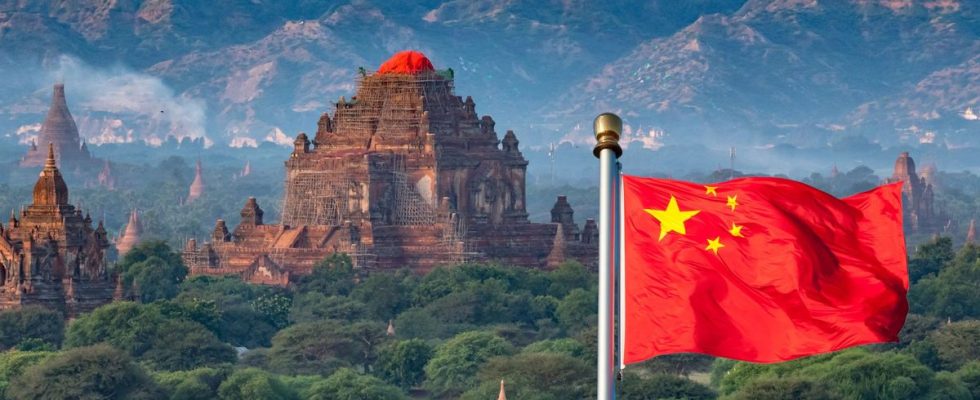Burma is on the verge of collapse. Armed ethnic minority groups have launched an offensive in the north of the country, on the border with China. The military junta, in power since its coup in 2021 and the ouster of Aung San Suu Kyi, faces a serious threat. On the other side of their common border, more than 2,100 kilometers long, Beijing wrinkles its nose. China quickly expressed its “strong dissatisfaction” and concern. But why was the Middle Kingdom so quick to condemn the clashes? How is Burma strategic for Beijing? 20 minutes explains everything to you, thanks to the insight of Emmanuel Véron, specialist in contemporary China and teacher-researcher associated with Inalco.
What relations does China have with Burma?
“Burma is almost a satellite state of China. Almost entirely in his hands,” Emmanuel Véron immediately emphasizes, adding that the two countries have been extremely close for “several decades.” At the end of the 1980s, China and Burma simultaneously suffered from economic sanctions by the West. Beijing then decided to renounce support from the Burmese Communist Party to concentrate on its domination of the country and invest massively. Over time, the Middle Kingdom’s influence in Myanmar grew into near-dependence for Naypyidaw. In 2021, near third of Burma’s foreign trade was destined for China.
Proof of this proximity, the long Sino-Burmese border is dotted with Chinese incursions. “For fifteen years, we have seen a lasting Chinese installation on the Burmese side. China is overflowing its borders. Along the route, duplicate towns, dominated by Chinese trade, have flourished”, illustrates the teacher-researcher at Inalco who evokes a “large land border invested by China”. Many Chinese go to Burma every day to work and obtaining visas has been made easier to encourage these daily exchanges. On Tuesday, Beijing also mentioned “casualties on the Chinese side” in northern Burma, without however specifying whether they had been injured or killed in the fighting. China’s ruling Communist Party has expressed its “strong dissatisfaction”.
Why is China so interested in Burma’s internal situation?
In addition to the essential question of the security of the myriad of Chinese nationals who live or move regularly in northern Burma, Beijing also has important strategic interests there. “China has developed numerous interests in this area and its economic presence is very strong,” notes Emmanuel Véron. Myanmar is indeed a wonderful reserve of natural resources between gas, wood and jade. The extraction and sale of the latter alone represented half of the country’s GDP in 2015, according to the British NGO Global Witness. “Some offshore gas fields, like Swe, are exploited by the Chinese,” specifies the China specialist. Financially, Beijing therefore has many interests in Burma. Especially since the country, whose geographical position is strategic, is integrated into the New Silk Roads project.
“China has built numerous infrastructures (such as roads) which cross Burma and give it access to the Indian Ocean,” explains Emmanuel Véron. A new railway line was built in 2021 to connect the two countries. These infrastructures allow Beijing to facilitate its maritime trade. For all these reasons, “Burma is far too strategically important for China to abandon it, regardless of the political color of the country,” says the professor-researcher at Inalco. In 2021, Beijing quickly supported the junta, even though it previously had peaceful relations with Aung San Suu Kyi, who was quickly received in the Chinese capital after her electoral victory in 2015. “The coup was a surprise for China but its interests in the region are such that it quickly sent strong signals to the junta which today enjoys support from Beijing,” explains Emmanuel Véron.
Could the Middle Kingdom intervene in Burma?
Given its strategic and economic interests in Burma, Beijing is closely monitoring the unrest shaking the north of the country. The alliance of ethnic minority groups has also blocked several trade routes to China. “Beijing will first focus on reopening roads and communication channels before regaining control of the economy,” predicts Emmanuel Véron who adds that everything will however be done “in a clandestine manner”. Because, in reality, China has already intervened in Burma.
Beijing finances the junta, notably providing it with military equipment. But also certain ethnic groups in Burma. Thus, “the separatist state of Wa is of Chinese obedience, supported and equipped by the Chinese”, illustrates the China specialist. If this group is not part of the alliance behind the offensive which is currently devastating northern Burma, China nevertheless shows ambivalence. “If there is political weakness in a state considered crucial for China, Beijing can keep control over it,” slips Emmanuel Véron. With this doctrine of “divide and rule”, China is therefore trying to avoid political cohesion which would allow Burma to turn to new investors and thus, to free itself, at least partially, from the Chinese cut. . The exercise is, however, particularly complex and the worsening of the unrest could, on the contrary, prove deleterious for Chinese trade.

